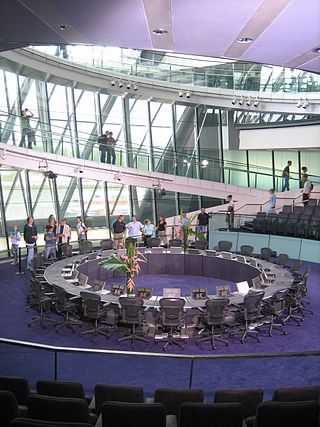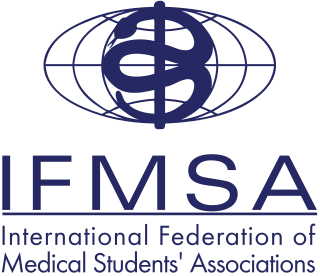
Model United Nations, also known as Model UN or MUN, is an educational model of the United Nations used for simulations in which students learn about diplomacy and international relations. At a MUN conference, each student works as the representative of a country, organization, or person, and must solve a problem with other delegates from around the world.

A council is a group of people who come together to consult, deliberate, or make decisions. A council may function as a legislature, especially at a town, city or county/shire level, but most legislative bodies at the state/provincial or national level are not considered councils. At such levels, there may be no separate executive branch, and the council may effectively represent the entire government. A board of directors might also be denoted as a council.
A students' union or student union, also known by many other names, is a student organization present in many colleges, universities, and high schools. In higher education, the students' union is often accorded its own building on the campus, dedicated to social, organizational activities, representation, and academic support of the membership.

New Zealand Rugby (NZR) is the governing body of rugby union in New Zealand. It was founded in 1892 as the New Zealand Rugby Football Union (NZRFU), 12 years after the first provincial unions in New Zealand. In 1949 it became an affiliate to the International Rugby Football Board, now known as World Rugby, the governing body of rugby union for the world. It dropped the word "Football" from its name in 2006. The brand name New Zealand Rugby was adopted in 2013. Officially, it is an incorporated society with the name New Zealand Rugby Union Incorporated.
Jules Maaten is a Dutch politician and since August 2022 Regional Director of the European Dialogue office in Brussels of the Friedrich Naumann Foundation for Freedom (FNF). Prior to that he was FNF Head of International Regions at the Headquarters in Potsdam (2020-2022), FNF Regional Director for sub-Sahara Africa, based in Johannesburg (2016-2020) and FNF country director in the Philippines (2010-2016), supporting projects for good governance, human rights, free trade and introduced the annual Africa Freedom Prize and in Manila the "It's All About Freedom"-project that includes an annual Freedom Run against corruption.

The New Zealand Young Nationals, more commonly called the Young Nats, is the youth wing of the National Party, a centre-right political party in New Zealand, and a member of the International Young Democrat Union.

The Space Generation Advisory Council (SGAC), in support of the United Nations Program on Space Applications, is a non-governmental organization and professional network whose goal is to convey the perspectives of students and young space professionals to the United Nations (UN), space industry, space agencies, and academia.

UN Youth Australia is a national youth-led organisation which seeks to educate and empower young Australians on global issues and foster an understanding of the work of the United Nations, human rights and International relations in young Australians. The organisation is fully operated by volunteers who have left high school and are under the age of 25, over 15,000 young people participate in UN Youth Australia’s programs, activities and events each year.
The Council of Australian Postgraduate Associations (CAPA) is the peak representative body for postgraduate students in Australia. CAPA's members are 33 postgraduate associations and the National Aboriginal & Torres Strait Islander Postgraduate Association (NATSIPA). CAPA provides member associations with representation to the Federal government, and peak bodies such as the Australian Research Council and Universities Australia, on issues affecting postgraduate students in Australia. In 2017, Australia had over 400,000 postgraduate students, representing one quarter of all tertiary students in Australia.

The International Federation of Medical Students' Associations (IFMSA) is a non-governmental organization representing associations of medical students. It was founded in May 1951 and currently maintains 139 member organizations from 130 countries around.

Young Labour is the combined youth wing and student wing of the New Zealand Labour Party. It hosts an annual conference and holds a range of additional national events, including fringe sessions at the Labour Party's annual conference. All Labour Party members aged between 15 and 29 years old are members of Young Labour.

New Zealand is a founding member of the United Nations, having taken part in the 1945 United Nations Conference on International Organization in San Francisco.

The World Assembly of Youth is the international coordinating body of national youth councils and national youth organisations. The full members of WAY are national youth councils. WAY currently has 140 member organisations from all continents. As the international coordinating body of national youth councils, WAY has special consultative status with the United Nations, the highest status possible for a non-governmental organization. WAY co-operates with the UN and many of its special agencies, particularly with UNAIDS, UNEP, ILO, UNESCO, UNFPA, UNICEF, UNDP, UNCTAD and WHO.

The Harvard International Relations Council(HIRC) is a non-profit organization that seeks to promote awareness of international relations based out of Harvard University. As several semi-independent but centrally funded programs, the IRC focuses on a number of different outreach areas in an attempt to engage and inform people on international issues and policy-making. Programs within the IRC include:

Kennedy Gollan Montrose Graham is a New Zealand politician and former Member of Parliament for the Green Party. He has served in the New Zealand Foreign Service for sixteen years, and lectured at the University of Canterbury and Victoria University of Wellington.

The International Pharmaceutical Students' Federation (IPSF) is a non-governmental, non-political and non-religious organisation that represents pharmaceutical students, pharmacy students and recent graduates from all over the world. It was founded in 1949 and it is the oldest faculty-based student organisation. IPSF represents over 500,000 individuals in more than 100 countries with 127 different representative pharmacy student member organisations.

The Student Volunteer Army (SVA) is a New Zealand student movement born from a Facebook page started following the 2011 Christchurch earthquake. The network has no military affiliation and is focused on facilitating community action through youth engagement, preparing for disasters, and service. The clubs and volunteers are supported by the Volunteer Army Foundation (VAF).

Tertiary education in New Zealand is provided by universities, institutes of technology and polytechnics, private training establishments, industry training organisations, and wānanga. It ranges from informal non-assessed community courses in schools through to undergraduate degrees and research-based postgraduate degrees. All post-compulsory education is regulated within the New Zealand Qualifications Framework, a unified system of national qualifications for schools, vocational education and training, and 'higher' education. The New Zealand Qualifications Authority (NZQA) is responsible for quality assuring all courses and tertiary education organisations other than universities. Under the Education Act 1989, The Committee on University Academic Programmes (CUAP) and the Academic Quality Agency (AQA) have delegated authority for quality assurance of university education. The Tertiary Education Commission (TEC) is responsible for administering the funding of tertiary education, primarily through negotiated investment plans with each funded organisation.

Te Pūkenga – New Zealand Institute of Skills and Technology is the largest vocational education provider in New Zealand. In February 2019, the Government announced that the country's sixteen Institutes of Technology and Polytechnics (ITPs) would merge to form the new organisation; the merger was effective on 1 April 2020. In addition to the polytechnics, Te Pūkenga also took over responsibility for industry training and apprenticeship training from nine industry training organisations (ITOs). Te Pūkenga's head office is located in Hamilton and with Peter Winder serving as acting chief executive.
Commonwealth Youth New Zealand is a youth-led nonprofit that educates young New Zealanders about the Commonwealth and the values of the Charter of the Commonwealth. It provides opportunities for young people to develop their leadership skills in an international context by hosting national and regional events for secondary students.

















